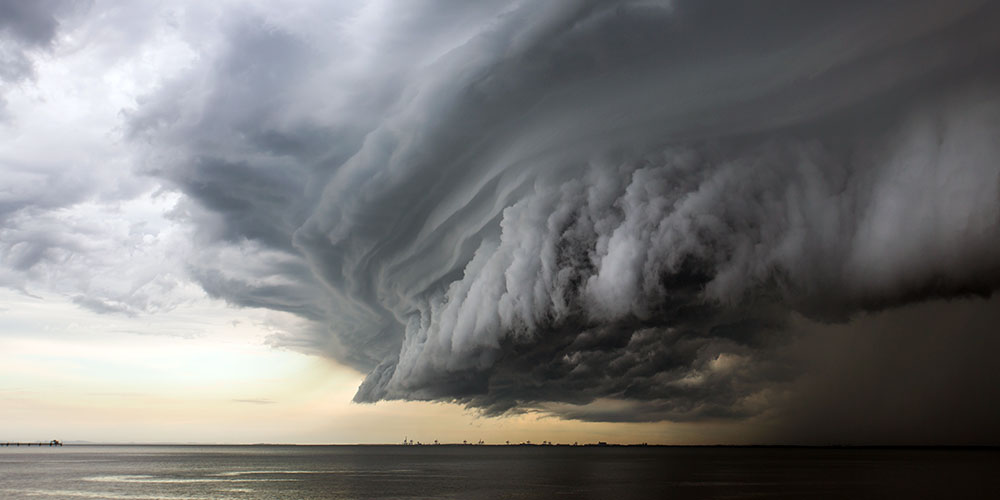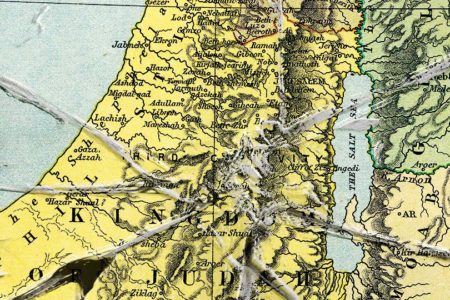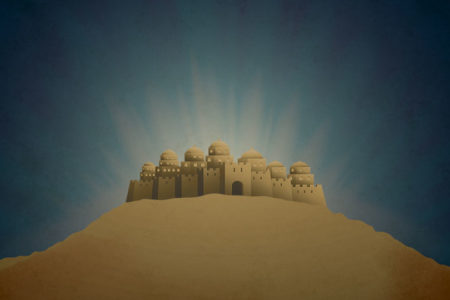The Coming Captivity Micah 1—2
God’s complaint against His people.
Thirty miles north of Jerusalem, in what most people call the West Bank, lie the ruins of Samaria, ancient capital of the northern kingdom of Israel. Though the area today is closed to tourists for security reasons, the biblical city’s exposed foundations still stand, a silent witness to the accuracy of the prophecies that open the book of Micah.
Delivered before Assyria’s three-year siege of Samaria (725–722 BC), Micah’s first prophecy was to the northern kingdom, which Assyria finally destroyed in 722 BC. But he addressed his message to “all…O earth” (all people everywhere). God’s punishment of Samaria, as well as the southern kingdom of Judea, was to be a lesson for everyone; and all humanity is called to attest to the fact that the Lord’s judgment is just. “Hear, all you peoples! Listen, O earth, and all that is in it!” (Mic. 1:2).
The Lord is pictured as “coming out of His place” and walking on the mountaintops (vv. 3–4), a visual that speaks of His majesty, power, and overwhelming presence. Since most cities were built atop tall hills and accessible mountains, it also speaks of His destruction of those cities.
Samaria’s walls were massive and especially reinforced and enlarged in anticipation of Assyria’s attack. Nevertheless, Micah warned that God would expose the foundations, undermine the walls, and “pour down her stones into the valley” below (v. 6).
Samaria’s and Jerusalem’s specific sins were idolatry and polytheism, which are likened to harlotry (v. 7). Verse 8 speaks of the voices God would leave in His wake—the eerie night cries of the jackal and ostrich, sounds of death and danger. Archaeological surveys indicate the number of villages in this region was reduced from almost 300 to about 50, with less than 15 percent of the population that existed prior to the Assyrian invasion remaining.1
The villages named in verses 8–16 were located in the path of an invading army, initially coming south on the coastal highway and then cutting into the foothills (Shephelah), heading toward Jerusalem from the southwest. In 722 BC, when Shalmaneser2 invaded, he stopped at Lachish. But 21 years later, in 701 BC, Sennacherib went all the way to Jerusalem.
Chapter 1 concludes with the citizens of Samaria and Judea in deep contrition: “Make yourself bald and cut off your hair, because of your precious children; enlarge your baldness like an eagle, for they shall go from you into captivity” (v. 16).
Cutting the garments and hair are well-known signs of mourning (cf. Jer. 16:6; Ezek. 27:31). The words stripped and naked were already mentioned (Mic. 1:8). The Hebrew word translated “eagle” can also mean “vulture.” Parents are pictured lamenting the loss of their families as the Assyrians cart their precious children into exile. On this sad note, chapter 1 concludes.
Chapter 2 is 13 verses long, and the first 11 continue the Lord’s complaint against the people of Judah as if in a court of law. Abruptly, the final two verses switch to the blessings God will eventually bring. Verse 1 begins with an exclamation that only occurs in prophetic books: “Woe,” implying that something bad is going to happen:
Woe to those who devise iniquity, and work out evil on their beds! At morning light they practice it, because it is in the power of their hand. They covet fields and take them by violence, also houses, and seize them. So they oppress a man and his house, a man and his inheritance (vv. 1–2).
Micah condemned the political and business leaders of Judah for abusing the poor. Because he lived among the farmers of Moresheth-Gath, he probably had neighbors who had lost their farms to such rapacious individuals. He imagined the schemers lying in bed, devising plans to foreclose on the needy. In fact, they may even have dreamt of doing evil.
Then, at first light, they sprang their legal traps, stealing farmland, homes (v. 2), and clothing (v. 8). Severely disadvantaged by such robbery were the male owners, their descendants (v. 2), wives, and children (v. 9).
The situation was particularly galling because the entire point of the Year of Jubilee (Lev. 25) was to ensure that no family in Israel was ever permanently impoverished. At least every 50 years, people would have a chance to start over financially because debts were to be forgiven and farmland returned to the original family owners.
In Micah 2:3 God invokes lex talionis (literally, “Law of the Talion”). It is the legal principle that the punishment must fit the crime (“eye for eye, tooth for tooth,” Lev. 24:20). Wicked men hurt other men’s families; therefore, God would afflict the wicked men’s families: “Behold, against this family I am devising disaster, from which you cannot remove your necks” (Mic. 2:3). Their inheritances would be seized by pagan Gentiles (“turncoat[s],” v. 4). This prophecy came true for the 10 northern tribes in 722 BC when the Assyrians deported most of the Jewish population and brought Gentiles to live on Jewish land.
Although Assyria greatly afflicted Judea in 701 BC, it did not destroy it. But by 586 BC the southern kingdom was finished, and the Babylonians had deported most of Judea’s citizens. After the Jews were allowed to return to their land, the local people who resisted the rebuilding of both the Temple (see Ezra) and Jerusalem’s walls (see Nehemiah) were the descendants of these “turncoats.” In the New Testament they are the Samaritans.
In verse 4, the phrase bitter lamentation implies the sorrow of a funeral procession: “Lament with a bitter lamentation, saying: ‘We are utterly destroyed!’” In fact, the poetry of this section uses a meter associated with funeral processions.
Verse 6 introduces the word prattle: “‘Do not prattle,’ you say to those who prophesy. So they shall not prophesy to you.” It means “to drip” and vividly pictures words dripping from a prophet’s mouth, perhaps mocking the man’s spittle when he spoke excitedly. The evil men did not want to hear the “drippings” of the true prophets, but they listened eagerly to the “prattler” who falsely prophesied that good times of wine and strong drink lay ahead (v. 11).
Verse 12 brings an abrupt change. It switches to a promise of future blessing and protection:
I will surely assemble all of you, O Jacob, I will surely gather the remnant of Israel; I will put them together like sheep of the fold, like a flock in the midst of their pasture; they shall make a loud noise because of so many people. The one who breaks open will come up before them; they will break out, pass through the gate, and go out by it; their king will pass before them, with the Lord at their head (vv. 12–13).
The words Jacob and Israel refer to the united nation, all 12 tribes. The word for “fold” (v. 12) is the Hebrew word Bozrah. Three places in the ancient Middle East bore that name, the most significant being in Isaiah 63:1—a town in Edom where the Messiah will have a great victory over Israel’s enemies: “Who is this who comes from Edom, with dyed garments from Bozrah, this One who is glorious in His apparel, traveling in the greatness of His strength?—‘I who speak in righteousness, mighty to save.’” (See also Isaiah 34.)
God will send a deliverer to the Jewish people who are penned up like a large flock of sheep awaiting slaughter. When were they bottled up in one location in need of intervention to save them? Perhaps Assyria’s 701 BC attack of Jerusalem would qualify. Scripture records that account three times: 2 Kings 18—19; 2 Chronicles 32; Isaiah 36—37. Jewish people from the surrounding region would have fled to Jerusalem, the only city Assyria did not capture. As godly King Hezekiah called out to God, God replied by killing 185,000 Assyrian soldiers in one night while they slept.
This miraculous, divine intervention may foreshadow a future, divine intervention when the Messiah will protect the Jewish people at the end of the seven-year Tribulation. Zechariah 14:1–5 and Revelation 12:6, 14–17 picture them trapped in Jerusalem, breaking out by way of a valley that God creates to help them flee from the Antichrist into the Judean wilderness toward Edom.
Daniel 11:41 even predicts the Antichrist will not control that portion of the Middle East: “He shall also enter the Glorious Land, and many countries shall be overthrown; but these shall escape from his hand: Edom, Moab, and the prominent people of Ammon.”
The word gate in Micah 2:13 probably refers to a gate in Jerusalem (see Micah 1:9, 12).3 The underlying structure of verse 13 indicates the “one who breaks open” (Hebrew, Ha Poretz, a recognized Messianic title) is identical to the individual in the last phrase: Jehovah. So in Israel’s darkest moments, its Messiah—the Lord, that great Shepherd of the sheep—will be there to intervene on their behalf.
ENDNOTES
- John H. Walton, Victor H. Matthews, and Mark W. Chavalas, The IVP Bible Background Commentary (Downers Grove, IL: IVP Academic, 2000), 781–782.
- In the Assyrian records, Sargon II claims to have defeated Samaria, but the Bible identifies Shalmaneser as king at the time (2 Kings 17:3–4; 18:9). Sargon II (Shalmaneser’s brother) may have been a general in the battle and, as the new king in 722 BC, took credit for the victory.
- Bruce K. Waltke, A Commentary on Micah (Grand Rapids, MI: Eerdmans, 2007), 138–143.








Thank You for making clear the events that have taken place relative to the ones that will take place!!!